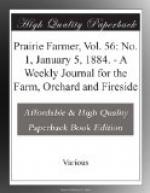* * * * *
THE DAIRY.
Dairymen, Write for Your Paper.
LESSONS IN FINANCE FOR THE CREAMERY PATRON.[A]
Any business to be permanent must make reasonable returns for the capital employed and give fair compensation for the labor bestowed upon it, otherwise it will be abandoned, or if continued at all it will be done under the protest of economic law. In addition to the ordinary circumstances attaching to business enterprise, the creamery business is essentially and peculiarly co-operative. It thrives with the thrift of all concerned—owner and patrons. It fails only with loss to all. The conditions of success, therefore, to the patrons are included in the conditions of success to the creamery, and vice versa.
The object of this paper is to suggest some of these conditions and some of the instances of violation of them.
It is hardly necessary to discuss the case in which peculiarity of soil or climate, the greater profitableness of some other kind of industry, or other reason, would so restrict the size and number of dairy herds as to make the locality a barren dairy region. Notwithstanding the splendid achievements of the dairy industry it is safe to say that it may not be profitable in any and every locality. Given the soil, the climate, the water, the people intelligent and disposed toward the exacting duties of this business, there are still many questions to be considered and many mistakes to be avoided.
It has been a pet idea in this country that competition is the corrective of all industrial evils. Competition without doubt holds an important place among the industrial forces, but may be carried so far as to defeat the very objects it is adapted to subserve, when intelligently encouraged. Carried to the extent of employing two persons or more to do the work of one, of absorbing capital without the full employment of it, it becomes destructive and expensive. We find, for instance, in many towns, a large number of commercial establishments doing business at an immense profit on single transactions, but the transactions are so few and so divided up among struggling competitors, that neither secures a profitable, nor even a respectable, business. With choice cuts of meat from twelve to eighteen cents a pound and butcher’s stock at three and four cents, we often see butcher shops multiply, but the price of meat usually remains the same. Indeed, the very increase of middle man establishments beyond the employment of these to their full capacity, and the consequent full utilization of the capital and labor employed, is a sure loss to somebody, and if it does not all go to the producer it is almost always shared by him.




